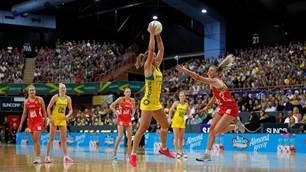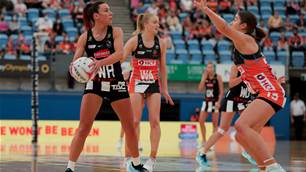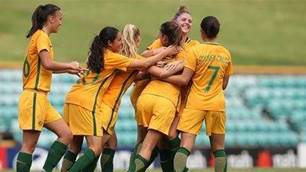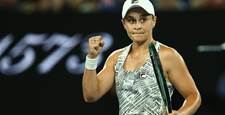Ahead of the new season of Suncorp Super Netball, the GIANTS Netball star and two-time World Cup winner discusses her journey to becoming one of the most inspirational mentors in Australian netball.
THE EXUBERANCE OF YOUTH
As a Sutherland Shire Association junior player, I started playing at the semi-elite level when I was 16, which also meant putting in semi-elite, part-time hours at training. It was a pretty big undertaking for someone that age. I was a part of two teams at school, plus I was also on an institute team, two state teams and I was playing in the Commonwealth Bank Trophy as well. Beyond the training, I also had five different coaches and five different groups of players to work with. That was a lot to juggle for a 16 year old. I did find it hard to manage it all, but because I was so young I didn’t really think about it; I just went and did it.
I see so many kids these days and they’re trying to do everything. They’re not just doing one or two sports – they’re constantly rushing around. After school activities, busy weekends and hanging with their friends – they commit to so much to fit it all in. It’s non-stop.

As young netballers we had the summer off – we had a lot of downtime – and now kids are going from one thing to the next without that time off. There’s almost an expectation that they need to push themselves and do everything at once. That’s not the case. I want kids to know that it’s OK to have a break and have recovery days – you don’t have to do everything.
When you’re a kid you also don’t really see the small injuries as setbacks and you don’t realise what overtraining looks like, especially when you’re not getting that recovery time. There are already many programs in place at organisations like Netball NSW and other sporting bodies and codes to help and guide young athletes, but there needs to be more education about how to manage all of the extra demands. That way young athletes can get an understanding of how to look after their bodies and not always rush off onto the next thing.
(Header image by Narelle Spangher.)
BUILDING RESILIENCE
Being professional players, my GIANTS Netball teammates and I have to complete a wellbeing check every morning. That system trickles all the way down; I’m pretty sure that our Netball NSW state teams undergo that wellbeing check as well. It’s a really good measure to monitor where, as players, we spike in physical soreness and also in mental fatigue.
Coming up as an athlete through the pathways to semi-elite and elite play in netball is something I will always be grateful for because it teaches you so much and sets you up to succeed, both within the sport and out in the world. As a netballer, you get into a rep team, then you get picked for the next squad, but you may not get picked for a game, so you build resilience. Then you try and qualify for another level of representative netball, and you may not get picked for that, or you may not get to play, so you build more resilience. From the start, you’re building resilience until you get to the top. So then, whatever is thrown at you out there, you have all these coping tools in your belt from what’s happened to you along the way. That is something I’ve been able to take into my professional career. The resilience of netballers is amazing.
It’s also not just about the physical aspects of the sport. Netball teaches you the proper ways to manage your life off the court. Some people might go into those difficult situations in life and not know how to react. Netball sets you up to succeed there, it prepares you for how to have the hard conversations and how to take the hard feedback. You don’t always get those opportunities to develop those skills.

Netball also preps you for life after you stop playing. So many of my GIANTS teammates and I are in a position where we have our own business or have other areas of focus in our life that are important to us outside of the game and away from netball. That’s a real positive. That places us at an advantage. It sets us up for life after netball and teaches us that there is more to life than having our sole focus be on the court every day.
I had my first experience working in welfare at Netball NSW and I also had a role with the GIANTS AFLW squad up until last year, where I worked with the athletes on their wellbeing. Working with the GIANTS AFLW team was a really great learning experience, as I got to see the way in which athletes from another sport undertake training, their different mentalities and how one way of doing things can’t be applied across the board. That’s one key thing that I took away.
It also made me reflect on how much things have grown and developed for women in sport. It’s amazing. The fact that women can grow up and get paid on a semi-professional level to play so many types of sport these days is just incredible to see. I love to think that young girls can see that there are so many options for them out there. They can see opportunities for themselves in so many sports now and that can’t be anything but a positive. It’s great for sport.
PROFESSIONAL MENTOR
It’s important for me to be able to contribute to the netball community in ways beyond those on the court. Mentoring up-and-coming players is something I’m really passionate about. I co-founded a business – NETFIT TOURS – that I manage on the side of my professional playing career. My business partner is Sarah Wall, who netball people may know from her years playing for the Melbourne Phoenix and Vixens, Queensland Firebirds and the NSW Swifts and GIANTS Netball. She’s an accomplished player and a great inspiration for all netballers.
We provide a year-long mentoring program for young players. There were 40 girls that entered into our program last year. They’ve just hit their fifth month. As part of the program, we take groups on trips overseas – 20 at a time. For our first one we went to Hawaii. It’s such a great experience: We train, play against other netball teams and participate in workshops with the players. It’s not a high-performance program at all; we’re not looking to create superstars. We just want to help create positive experiences and leanings for the athletes that they can use in their everyday life.

It’s an application-based program. We get applicants to identify their weaknesses, their strengths, the mentors in their lives and how they’re going to give back to the sport. That’s one of the most important things. It’s about understanding that, while netball can bring so much to your life, there’s a life outside of netball.
There’s a real sense that we’re building a supportive community as well. They’re all from different parts of Australia and New Zealand, but each month everyone in the group jumps on a Skype call. It’s a really good catch-up for them. We also have this little room on Zoom. It’s like a conference video call session. And it’s always open for them to go in whenever they want a group chat. The current group is using it all the time, which is really good to see.
MY ADVICE FOR YOUNG ATHLETES
The main advice that I always give is to find the people in your life who are super-supportive, whether you’re at the top of your game or at the bottom. You need people who, when you walk into a room, are going to have you leave it feeling happy. Find the people who are going to bring positivity and support to your life and surround yourself with them. If things get tough, you always have those people to turn to, who allow you to have your personal values and accept what you stand for.

I’m lucky that I get to do what I love every day, from playing professional netball to NETFIT and other areas of my life – it motivates me and it keeps me inspired. I actually play better when I’ve got those things keeping me focused and engaged and I’m sustaining that level of being positively engaged across my life. So my other piece of advice is to find the things that you love and keep doing them, in whatever ways you can. Not just in sport, but in life.
Related Articles

Australian Diamonds series with England cancelled

Round 2 Suncorp Super Netball Pic Special













